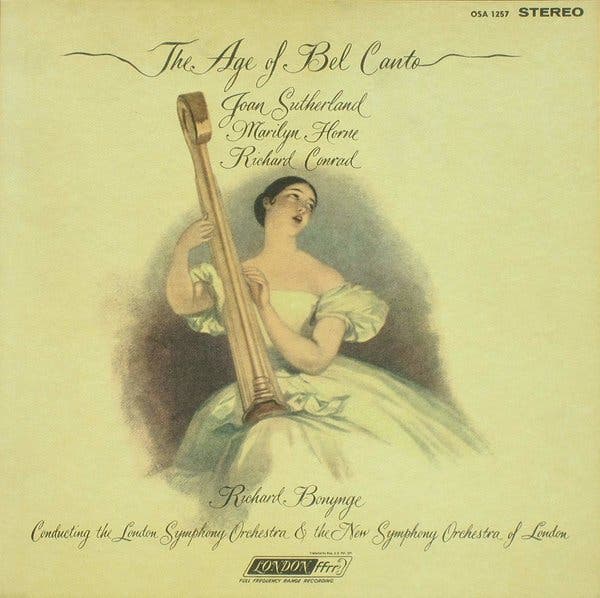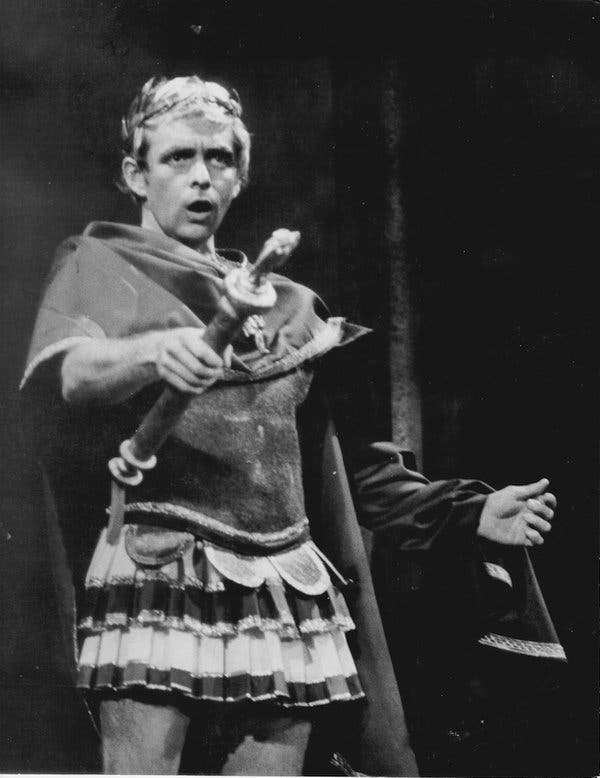Richard Conrad, a tenor who was plucked from obscurity by the acclaimed soprano Joan Sutherland to take part in a landmark 1963 recording, and who later overcame a throat injury suffered in an assault and found a successful third act producing lesser-known operas, died on Aug. 26 at his home in Eliot, Me. He was 84.
The cause was heart disease, his brother, Howard Conrad, said.
In 1961, Mr. Conrad, then a member of Boston Camerata, an early-music ensemble, gave a splendid performance of a florid aria from Monteverdi’s “Orfeo” in a concert at the Museum of Fine Arts that attracted the attention of Ms. Sutherland, who was singing in Boston at the time.
“One of the players from the Camerata concert told her, ‘There’s a guy here who sings just like you,’” Mr. Conrad recalled in a 1995 Boston Globe interview. He was referring to Ms. Sutherland’s technical expertise in bel canto opera, the style that flourished during the late 18th and early 19th centuries and was characterized by long vocal lines rich with passagework and coloratura embellishments.
Ms. Sutherland and the conductor Richard Bonynge, her husband and frequent collaborator, invited Mr. Conrad to audition two months later. He prepared two Handel arias.
“I have to say that I never in my life sang like I sang that day,” Mr. Conrad recalled. “Everyone was astonished, including me.”

They asked Mr. Conrad to sing on “The Age of Bel Canto” a two-LP album of arias and ensembles, with Mr. Bonynge conducting. The recording was intended to provide larger historic context to the era of bel canto, which was then mostly associated with Bellini, Donizetti and Rossini, by including works by Baroque composers; rarities by Arne, Auber and others; and arias by Mozart and Verdi.
The other emerging singer invited to take part was the mezzo-soprano Marilyn Horne, who in no time went on to a spectacular career. For Mr. Conrad, the album brought attention to the sweet tone and admirable lightness of his singing, and his agile way of dispatching runs and embellishments. It also hinted at his vocal limitations, something he acknowledged in the 1995 interview.
“I started off as a baritone, which is what my voice always was, naturally,” he said. “But my voice was so light in those days I could sing easily up in the tenor range if I used the kind of technique countertenors use. This meant there was no ring in my voice.” That lack of “ring,” an extra measure of radiance and volume, made it difficult for Mr. Conrad to fulfill early expectations.
Pursuing opportunities in Europe, he settled in Rome, which became his base until the early 1970s. “I was running away from being heard of,” he said. “I thought I could learn to sing with Italian ring.” Though that did not happen, Mr. Conrad developed a modest but solid career in Europe and America, both performing and teaching.

He found his niche after moving back to Boston in 1980, when he founded the Boston Academy of Music, a successor to the first academy, which flourished in the middle decades of the 19th century. He produced, sometimes directed and often sang in well-received productions of overlooked works, including operas by Rossini and Donizetti and Gilbert and Sullivan operettas.
Then, in 1983, he was attacked on a street corner in Somerville, next to Boston. “I was bashed in the side of the head by a mugger I never saw,” he said in the Globe interview. “I let out a shriek and dislocated my voice big time.”
He was reluctant to talk about the specific nature of his injury and what exactly happened, even to his brother, who is his only survivor.
“Richard just said, ‘Some guy mugged me, robbed me and beat me up,’ and that was it,” Howard Conrad said in a phone interview.
After struggling to sing for years, Mr. Conrad went to the Lichtenberg Institute in Germany, a voice training center, where he slowly rebuilt his voice, emerging as the baritone he had always been — “untouched by all of my tenor experiments,” he later said.
Richard Conrad was born on Aug. 12, 1935, in Astoria, Queens, the elder son of Lester Conrad, a boat mechanic, and Mildred (Murley) Conrad, a homemaker. The family soon moved to Larchmont, N.Y., in Westchester County, where the Conrad brothers grew up.
He graduated from the State University of New York at Farmingdale and continued his education at Boston University, where he focused on commercial and fine arts. He also studied voice, as a baritone, privately.
He ran the Boston Academy for 23 years. Among its popular offerings was a free outdoor production of Gilbert and Sullivan’s “H.M.S. Pinafore” presented on a stage erected in front of the docked U.S.S. Constitution. The critic Lloyd Schwartz wrote in The Boston Phoenix that Mr. Conrad, “in a curly hairpiece that made him look like Harpo Marx,” was “in particularly good voice as Captain Corcoran.”
During the 1990s Mr. Conrad toured in revues of songs by Cole Porter, Jacques Brel and Noël Coward, and also performed in musical theater productions in New York, including as Albin in “La Cage aux Folles.”
In 2000, the Boston Academy presented a critically hailed production of Kurt Weill’s “Lady in the Dark.” But the expense involved may have contributed to Mr. Conrad’s being ousted in 2002 by his own board, which “was evidently tired and fearful of supporting an essentially one-man operation,” as Mr. Schwartz wrote in a 2013 article for Opera News.
Undeterred, in 2003 he founded a new ensemble, the Bostonians, from which he retired in 2016.
For years Mr. Conrad was a beloved figure in the Boston musical community, whose parties at his home in Charlestown often included a performance by Flurry Knox, a beagle, who, with Mr. Conrad at the piano, would bark out what sounded uncannily like the opening phrases of Verdi’s showpiece tenor aria “Di quella pira.”
 EU News Digest Latest News & Updates
EU News Digest Latest News & Updates



